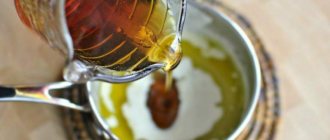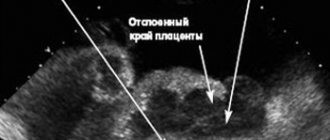| A cough in most cases indicates that a person has a cold. Pregnant women may also begin to cough, and in any trimester. It is worth remembering that the immune system for healthy pregnancy is weakened. If you sat in a vehicle next to a sick person or became hypothermic, then an acute respiratory viral disease is quite possible. |
- Why cough medicines are dangerous for pregnant women
- The dangers of coughing during pregnancy
- Treatment of cough in the first trimester
- Treatment of cough in the 2nd and 3rd trimesters
- Physiotherapeutic treatment
- Alternative treatment for cough in pregnant women
- Cough medicines that pregnant women should not use
- Prevention of cough during pregnancy
Why cough medicines are dangerous for pregnant women
Cough is not an independent disease.
This is a reflex in which the pregnant woman’s airways are cleared of bronchial secretions, which contain the causative agent of the disease. A cough can be a sign not only of acute respiratory infections, but also of allergies. Moreover, irritants can be very different. Treating cough during pregnancy is difficult, because any medicine is harmful for those who are expecting a child. Even herbal preparations can put gestation at risk. Traditional methods also cannot be considered absolutely safe. Some plants have a stronger effect than pharmaceutical chemicals. And this can negatively affect the development of the embryo.
You should also not drink children's cough syrup or other medications that are approved specifically for children. They can also enter the fetal circulatory system. Therefore, if a cough appears (especially if you don’t know exactly the cause), you need to consult a doctor.
Foods that help relieve cough
An excellent alternative to medications are foods that will help treat cough. Hot milk with butter and soda is actively used at night (1 glass: 1 tsp: 1/3 tsp, respectively). Many people also use honey for coughs during pregnancy. If you are not allergic to it, you can add it to tea, milk, just eat it, put it on lemon and suck it. In addition to the listed remedies, you need to include natural vitamins in your diet - more fruits and vegetables, then no illness will affect you.
The dangers of coughing during pregnancy
The symptom in question indicates a viral or bacterial pathology. Therefore, treatment is necessary, otherwise the process will become chronic and complications will develop. It is likely that the infection can penetrate the placenta, which is why the baby may not develop properly. The consequences of the disease can be a frozen pregnancy or miscarriage.
Coughing, as already noted, is a reflex. Therefore, in this process the uterine tone also increases. This leads to hypoxia (lack of oxygen) of the embryo. The consequence may be miscarriage. In women diagnosed with placenta previa, a cough may result in bleeding from the uterus.
If the cough is severe, then nausea may also occur. And with toxicosis, this significantly worsens the quality of life of the mother.
Treatment of cough in the first trimester
In the first months, the baby's organs are formed. At the first screening, it is already clear that the fetus has a human shape. Therefore, in the first trimester, mommy should be attentive to her health. After all, the slightest violations lead to serious developmental defects in the child. Therefore, it is better not to get sick in the first 3 months of gestation.
Some pregnant women believe that cough drops sold without a prescription in all pharmacies are safe. But they contain many substances that are in no way useful for a woman (especially in position):
- flavorings
- sweeteners
- preservatives
- eucalyptus or mint extracts, etc.
It becomes easier only for 20-30 minutes, and then you need to suck on the lollipop again. Calculate how much sugar and harmful substances you eat this way per day.
In the first trimester, you can treat a dry cough with the following medications:
- Eucabalus
- marshmallow root syrup
- mucaltin
- broncho-gran
- stodal
- pulsatilla
Dietary supplements for the treatment of cough in the first 3 months of gestation:
- Mamavit
- Bifidophilus Flora Force
- Pregnacare
It is also believed that the following drugs are acceptable (but there is insufficient research):
- bronchicum
- gedelix
- Doctor Mom
Libexin in the first trimester is dangerous for the fetus. But, if the doctor decides that the risk to the mother is greater than the risk to the fetus, then he may prescribe this medicine.
Wet cough in the first 3 months of gestation is treated with the following means:
- broncho-gran
- stodal
- pulsatilla
- Dr. Theiss
As for dietary supplements for the treatment of wet cough, they are similar to those listed above for dry cough.
Causes of cough
Since a cough only signals the presence of some disease, it can be caused by the following ailments:
- bronchitis (see How and how to treat bronchitis and cough in an adult);
- tonsillitis;
- pneumonia;
- flu;
- measles;
- ARVI;
- whooping cough;
- allergic reactions of the body.
As a result of pregnancy, changes occur in the body that are necessary to bear a child. But they also affect her well-being.
Immunity becomes an order of magnitude lower than usual, so the appearance of various ailments, primarily viral, is not uncommon. Therefore, you should be as careful as possible about your health.
Treatment of cough in the 2nd and 3rd trimesters
During this period, the baby’s organs are finally formed. The body matures in order to exist after childbirth without the support of the mother’s body. Therefore, it cannot be said that treatment of cough during pregnancy after the 4th month can be carried out with any medicine. If the doctor sees that the simplest methods did not help to recover, he can attribute synthetic ones to the patient.
Treatment of dry cough in the 2nd and 3rd trimesters is carried out with the following drugs:
- broncho-gran
- stodal
- pulsatilla
- mucaltin
- marshmallow root syrup
- Eucabalus
Dietary supplements for the treatment of both dry and wet cough, starting from the 4th month of gestation, are carried out with the same drugs as listed above for the first trimester.
Wet cough in the 2nd and 3rd trimester is treated:
- broncho-granoma
- Pulsatilla
- stodal
- bronchicum, etc.
During the gestational period in question, Bronchipret is sometimes used. But studies have not yet proven its complete safety for the pregnant woman and the fetus.
What a woman should do if she has a severe cough in the 1st trimester
If signs of ARVI appear at the beginning of pregnancy, and even more so a cough develops, you should immediately consult a doctor. This period is very important due to the fact that in the first 3 months cells actively divide, creating organs and systems of the child’s body. Let's imagine the situation from the inside: in a perfectly protected warm place, inside the mother, the process of forming legs, arms, nose, sponges, and internal organs is actively taking place day and night. And here, the baby’s nervous system, which has just begun its development, feels a threat in the form of a twitching of the abdomen, a strong sound and tension in the mother’s muscles, as well as an infection spreading throughout the woman’s body - all this is a cough.
If a cough occurs during pregnancy (1st trimester), you need to take a very responsible approach to its treatment, because at this time the formation processes slow down. In addition, the supply of nutrients and vitamins to the child is difficult. If this condition continues for a long time, some organs may not form properly or not fully form. This can also occur due to inadequate treatment, such as antibiotics. Cough remedies during pregnancy at this stage are selected to be the most harmless. The main ones:
- Inhalation is an effective remedy for dry as well as wet cough.
- Compresses. There are effective recipes:
- compress with honey (spread liquid honey on your chest, cover with plastic and wrap yourself in something warm);
- from potatoes (boil a couple of potatoes, crush them and, wrapped in plastic and a knitted rag, apply to the chest for 10 minutes);
- compress with cabbage and honey (take a large leaf of cabbage, dip it in boiling water so that it is not cold, then anoint it with honey and sprinkle with a small pinch of salt, then put it on the chest, cover with plastic and a warm blanket), this compress can be done on all night long.
Physiotherapeutic treatment
Home and hospital physical therapy methods for treating cough will be discussed below. They are considered safe and are used mainly in the absence of expectorated sputum. Gargling and inhalation are important.
The following methods of physiotherapy are prohibited:
- banks
- mustard plasters
- radiation of any kind
- steam baths for feet
- hot baths
- electrotherapy
When you go to a clinic or hospital for physiotherapeutic treatment, you risk becoming infected with something infectious from other people. Therefore, there are simple remedies for treating a pregnant woman’s cough at home.
Inhalations
Suitable for this method:
- regular teapot
- nebulizer
- standard plastic inhaler
- cardboard funnel
Follow these rules when performing procedures:
- your body temperature should not be elevated
- the solution should be a maximum of 30-40 degrees
- do inhalations for 5-10 minutes 3 to 6 times a day
- After the procedure you need to not eat and remain silent for an hour
What is used for inhalation:
- Pour 20 grams of sage herb into 250 ml of boiling water, then cool to 30-40˚C
- 10 grams of chopped garlic and 10 grams of eucalyptus leaves pour 1000 ml of boiling water, then cool and inhale
- Pour 10 g of bee honey into a glass (200-250 ml) of warm water (not boiling water!)
- Pour 50 grams of baking soda into 1000 ml of boiling water and cool
Gargling
Rinse solutions are prepared before the procedure itself; they also need to be cooled to the optimal temperature. Do 6 to 8 rinses a day after meals.
The following rinsing solutions are suitable for pregnant women:
- Pour 10 grams of plantain leaves into 250 ml of boiling water and cool to the desired temperature
- 250 ml boiling water + 10 grams of linden flowers, cool
- 10 grams of chamomile flowers + 200-250 ml of boiling water, cool
- ½ tsp. baking soda + 200-250 ml boiling water, cool to 30-40 ˚С
Home Remedies
In addition to drug treatment for cough, there is also home treatment, which involves carrying out certain procedures to help eliminate it. If the second trimester of pregnancy is complicated by a cough, and the woman does not intend to treat it with medication, she can use home methods, for example:
- do inhalations;
- gargle.
The second trimester of pregnancy prohibits the use for cough treatment:
- cans;
- mustard powder;
- warming up in the bath;
- electrophoresis;
- hot foot baths.
The modern method by which cough is treated is inhalation. It can be carried out either using a special apparatus or using improvised means. The main thing is not to use this treatment if the pregnant woman has an elevated body temperature. Do not overdo it with the number of such procedures. It is not recommended to carry out more than 6 inhalations per day, especially if the temperature of the product used for them exceeds 40 degrees.
If a pregnant woman decides to treat a cough on her own using inhalations, then only safe means should be used for this. You can use solutions based on soda, sage, and honey.
You can also treat a cough by gargling. The rinse should be prepared shortly before the procedure. Not only can a woman experience toxicosis at the beginning of pregnancy, it can also accompany her second trimester. Therefore, when choosing a rinse, you should resort to those that will not exacerbate toxicosis. You can make your own gargle, for example:
- Water + teaspoon of soda.
- Water + 2 teaspoons chamomile.
- Water + 2 teaspoons linden blossom.
- Water + 2 teaspoons dry plantain.
This treatment is safe for the fetus and helps eliminate cough.
Alternative treatment for cough in pregnant women
You should also not use traditional methods without the advice of a doctor. You also need to watch how your body reacts to one or another treatment method. Honey
When coughing, it is used internally and externally. With a dry cough, mucus will begin to be coughed up, which is medically called a productive cough. If the cough is initially wet, honey does not lose its therapeutic relevance. In the morning and before going to bed, you can warm up some natural honey and rub it on your chest. You can also apply honey as a compress to your chest at night. Just isolate the compress well so that in the morning the whole bed and the whole body are not sweet. For insulation, cling film or parchment, which are sold in any cosmetic stores and supermarkets, is suitable.
Internal cough during pregnancy is treated with honey as follows:
- dissolve one teaspoon of warmed honey 3 times a day before meals
- add 1 teaspoon per 250 ml of drink to tea or plain water/Kampot honey
- mix honey and fresh black radish juice 1:2 and drink two tablespoons three times a day
Remember that honey often causes allergic reactions. If you notice any disturbing symptoms and manifestations after treating your cough with honey, stop treatment.
Milk
Warmed milk helps with sore throat, relieves cough and calms nerves. You need to drink it in small sips, slowly. It is recommended to mix milk and non-carbonated alkaline mineral water. This way you can make a dry cough moist.
Another way: take 200 or 300 ml of milk and 1 tbsp. sage herbs (can be bought at any pharmacy or dried yourself), boil. Take one tablespoon before going to bed. Next method: a drink made from milk and figs. You need to take 4 dried fruits and cook them in 550-650 ml of milk until the mixture turns brown. Drink 100 ml warm 3 times a day.
Onion and garlic
These are natural antiseptics. They contain life-saving phytoncides that defeat almost all known bacteria and viruses. You can disinfect the rooms in which a pregnant woman stays. You can also do indirect inhalations with these plants. To do this, cut 3-4 cloves of garlic and 1 head of onion into pieces and place on plates or in another container. And place these containers around the apartment or house.
Fresh garlic juice or onion juice can be used to treat cough during pregnancy. To do this, you need to take 3-4 cloves of garlic or 1 onion and chop them, and then add 1 tbsp. l. natural honey. After about 30 minutes you will notice that juice has begun to come out. The liquid can be expressed in any convenient way. Use this remedy 2-3 times a day, one teaspoon.
How can you cure a dry cough during pregnancy?
Answers:
tele 2
I recently cured bronchitis with marshmallow root. The pharmacy recommended marshmallow root and menovazine for rubbing the chest. It helped a lot.
_,,,^._.^,,,_
Grandmother's method) Bring milk to a boil and add honey and butter. It is advisable to drink before bedtime
~♥~ ♥ ~♥~
Stodal, herbion, coltsfoot, breast mixture, mustard plasters, pepper plaster, mucaltin, cough tablets, radish. In general, see a doctor.
GREEN-EYED
ask vra4a or v opteki.
Anya Anina
well, ordinary mucaltin
Kristina Myagkova
1 A gentle but effective method of treatment is inhalation. They do an excellent job with a dry cough that exhausts a pregnant woman. The method is cheap and can be done at home. Inhalations are not contraindicated for expectant mothers, so they can be performed without fear of negative consequences for the fetus. The presence of a nebulizer or inhaler greatly facilitates the procedure. But their absence is not an obstacle to treatment. Inhalations can also be carried out using improvised means.
2 Boil potatoes in water with garlic and onion. Hot steam, which must be inhaled while bending over the pan, will thin the sticky mucus and make it easier to remove. After several procedures, the cough will become soft and productive.
But potato inhalations are far from the only remedy against dry cough. You can inhale vapors of medicinal herbs: St. John's wort, chamomile, thyme, sage. When the sputum finally begins to disappear, it is necessary to continue inhalations, but with other herbs: coltsfoot, plantain, string and yarrow.
3 Aromatic oils sometimes help even better than medicinal herbs. And they are also approved for use during pregnancy. A couple of drops of mint or pine oil added to a glass of hot water will significantly ease the condition of the expectant mother. Alternatively, you can use eucalyptus or rosemary oil. Inhalation should be done for at least five minutes. It will be good if you cover yourself with a towel during the procedure - this way the steam, saturated with oils, will go directly into the lungs without scattering throughout the room. The effect of this treatment lasts for at least an hour, so it will be better if you refrain from walking and eating during this time.
4 Drink plenty of fluids, this will speed up your recovery. Fruit drinks, teas, herbal decoctions, warm milk - all this is extremely useful for dry cough. Make sure that the daily volume of liquid you drink is at least two liters. And if you add butter, honey and a pinch of soda to milk, the effect of the drink will increase significantly.
Svetlana Anatolyevna
tea with ginger, I really wondered if ginger can be consumed during pregnancy... . They wrote to you about breastfeeding, but they forbade it for me... . They prescribed me tea with chamomile, I remembered... but it helps better with ginger
Valeria Yusupova
If the cough is dry and severe. I drank Prospan syrup. It helps get rid of phlegm well. It has a mild effect on coughs. Does not cause addiction or allergies. Before bed, a glass of warm milk with honey and butter. Unless of course you are allergic to honey.
Cough medicines that pregnant women should not use
The following drugs are prohibited during pregnancy (it has been proven that their use by the mother negatively affects the development of the fetus):
- Ascoril
- Alex plus
- Bronholitin
- Flupex
- ACC
- Insti
- Tussin plus
- Joset
- Glycodin
- Travisil
- Pertussin
- Thermopsis
- Terpincode
- Codterpin
- Codelac (phyto, broncho)
Plants that are strictly forbidden to be used by pregnant women to treat cough symptoms:
- comfrey
- coltsfoot
- echinacea
- ginseng
- Eleutherococcus
- St. John's wort
- ginkgo biloba
Drug treatment in the second and third trimesters
At this stage of pregnancy, the baby is formed. Although the list of restrictions on the use of drugs has been significantly reduced, it is advisable to do without them.
To the herbal medicines, vitamins and homeopathy preparations recommended for use in the first trimester of pregnancy, the following medications are added:
- "Coldrex®Knight" - used when body temperature rises above 38°.
- "Falimint" is an antitussive drug.
- "Libexin" - bronchodilator, antispasmodic effect.
- “Stoptussin” is a combined therapeutic effect.
- "Akodin" - inhibits the excitability of cough - the secretomotor effect.
Drugs prohibited for use at any stage of pregnancy:
- "Alex Plus".
- "Codterpin."
- "Thermopsis".
Important! Medicines are prescribed by the attending physician. Self-medication is excluded!
Prevention of cough during pregnancy
As already noted, it is better not to get sick while carrying a child. Any illness and any treatment negatively affects the condition of the unborn baby. There are simple rules for cough prevention for pregnant women:
- stay in public places as little as possible
- if you notice that there is a sick person next to you, move away from him as far as possible
- before visiting a store or other public place, lubricate the nasal mucosa with a small amount of oxaline ointment or Vaseline
- keep your mouth closed, try to breathe through your nose in public places
- after returning from the street, wash your hands thoroughly and rinse your nose
- After visiting public places, it is better to rinse your throat with boiled water at room temperature
- humidify the air at home, ventilate the room
- walk outdoors as much as possible
- dress for the weather
- avoid sudden climate change
As soon as you start coughing, go to the doctor. Self-medication is strictly contraindicated for pregnant women!
Dry and wet cough during pregnancy
The pattern of cough can help in diagnosing a patient.
Dry cough is a type of inflammation of the respiratory tract, characterized by excess mucus on their walls, while the patient has no phlegm.
A dry cough during pregnancy signals the possible onset of the development of a cold: respiratory infection, bronchitis, pharyngitis, sinusitis, otitis, etc. This cough can be paroxysmal. Over time, it can turn into the wet type.
A wet cough is a type of inflammation of the respiratory tract, characterized by the presence of mucus secretions in them. Sputum discharge is a pathological secretion mixed with saliva and mucous secretion.
Such a pathological secretion is a suitable habitat for pathogenic bacteria. During a cough, the lungs, trachea and bronchi try to clear themselves of mucus. A wet cough, if the necessary treatment is not carried out, can become chronic. It appears only with airway disease.
A wet cough in a pregnant woman can be a symptom of the following diseases: influenza, acute respiratory and viral infections. One of its causes is smoking.











